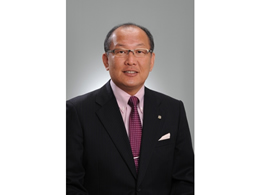Message from the Director
Working Towards Reconstructing Morality and Further Deepening Moral Education for the 21st Century
―Establishment of the Center for Moral Science and Education―
Chikuro Hiroike’s Philosophy in Today’s Society

President, CMSE Director Osamu Nakayama
Modern Japanese society is faced with a mountain of issues such as environmental destruction, loss of morality and collapse of education systems. Unable to find answers to the question of how we should live, we continue our search for a code of conduct for individuals and for all society. It has been said that the twenty-first century embodies “knowledge-based society”, whereby new knowledge, information and technology have a greater significance in the fields of politics, economy and culture. Yet, merely enhancing our knowledge cannot deliver peace, security and happiness to the people of the world. Knowledge cannot truly serve our society unless it is accompanied by a high level of morality. It is our task to rebuild morality in today’s society, while also re-establishing types of knowledge suitable for this new era.
Since its establishment, Reitaku University has always upheld the educational philosophy that the true value of knowledge is evinced only through integrity and sound morality. The university has deep roots reaching back to the college for moral science, founded by Chikuro Hiroike in 1935. With the goal of scientifically verifying the effects of enhanced moral practice to establish a path for world peace and human happiness, Hiroike envisaged the launch of a “moralogy college” as an organizational initiative for pursuing the new study of “moralogy” within the framework of the school and its course of social education. This “moralogy college” itself did not actually come into being, but the founder’s lofty ideals have survived the test of time, and led to the establishment of a technical college, a junior college, and then Reitaku University in 1959.
In the beginning, Reitaku University was comprised of just a faculty of Foreign Languages (a British English course, a German course and, from the second year, a Chinese course). The decision to launch the university with this as its sole faculty reflected the fact that exploring overseas opportunities was the only path of survival for our nation in those days, after the loss of 40% of its territory / resources after the Second World War and the population growth of over one million people each year. In other words, the founder believed that to win the trust of the world at large, Japan needed to acquire knowledge enhanced by global literacy and moral integrity, and thus make its contribution to world development without depending on the backing of the state.
Coincidentally, in the ceremony marking the opening of Reitaku University, the inaugural university president Chibusa Hiroike described the characteristics of the Reitaku style of education as follows: “It is my belief that education is the most ideal means for establishing the spirit of benevolence in a person’s heart. It is only when we plant the seeds of modern science and knowledge in the soil of a benevolent spirit, and find practical application for the seedlings that emerge, that the radiant fruits of academia begin to shine.” This philosophy, which combines knowledge with moral integrity, continues to live at the heart of our university education, as the moral and academic tradition of Reitaku since its founding.
Chikuro Hiroike is also quoted as saying that “respecting virtue is more important than academic, knowledge, money or power.” His stance in life was that people should have a strong footing rooted in human morality or integrity, rather than the academic, knowledge, money, or power that most of us often strive to attain in society. For him, these worldly elements become meaningful only when there exists a firm foundation of sound morality.
Moral education based on the concept of moralogy represents both the beginning and the end of Reitaku education. This educational philosophy will never be shaken or reduced in strength, no matter how much the times may change.



